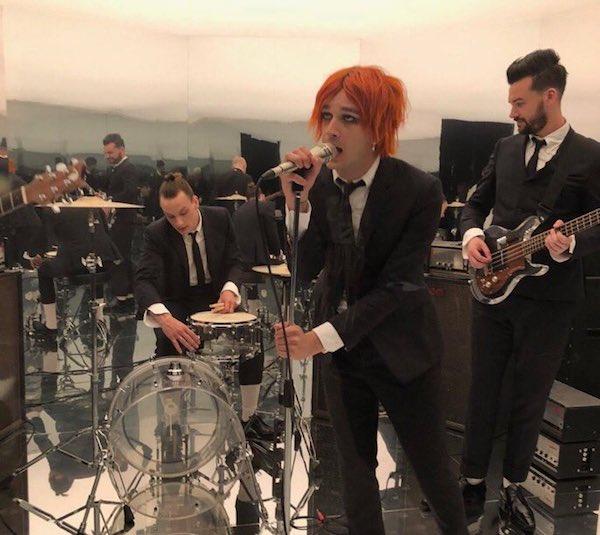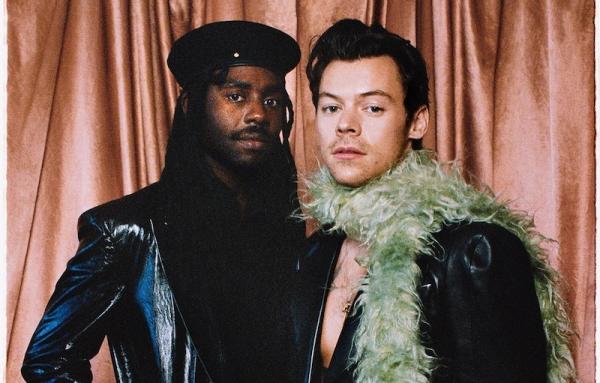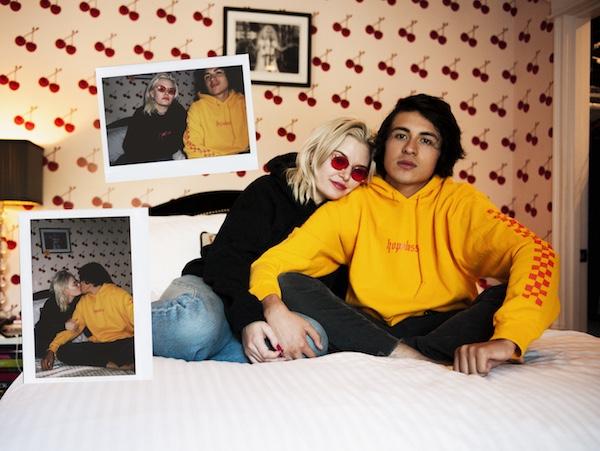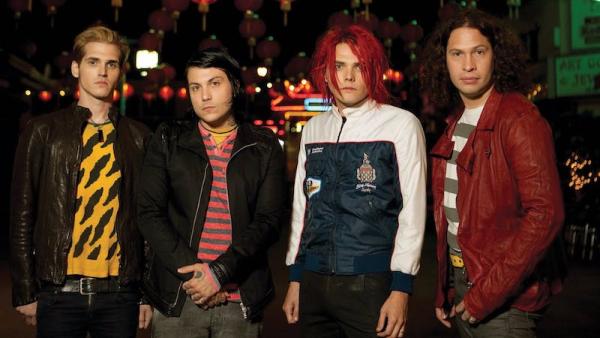Alongside the release of her latest single, 'Good Boy', Paris Paloma has shared with Coup De Main an essay to pair with the track which details her experience and thoughts on rampant misogyny both online and in day-to-day life.
Read her full essay below...
"I wrote “Good Boy” as a message to men that you have more in common with me, more in common with everyday women, than you do with men in power pushing capitalist patriarchy, so don’t be their good boy.
The knee-jerk reaction to women criticising patriarchy by calling them “man haters,” or trying to suppress their voices, is an act that bites off a man’s own nose. If men uphold a system that isolates and betrays them, then they themselves will be cut off from community and love.
Many people, including well-meaning male allies, often implore men to get involved in feminism and gender equality solely because of the ways Patriarchy negatively affects men as well as women. It’s somewhat disappointing, because despite everything I’ll go on to mention in this essay: the problem of toxic masculinity, the “male loneliness epidemic,” the growing problem of the radicalisation of young boys online, the most pressing part of the problem is the culture of violence towards women and girls everywhere. This should be reason enough for any empathetic man to try to effect change. I wrote “Good Boy” about those men who have never self-reflected or entered feminist spaces with the view to help the cause. I wrote “Good Boy” about the boys and men who truly feel that uplifting patriarchy and suppressing women is what will bring them freedom, power and happiness.
It could not be further from the truth.
As a female songwriter who writes a great deal about the female experience, it’s a given that a lot of my songs are also tied up in my examination of toxic masculinity and patriarchy, and looking back on the past two years being a public facing artist, I still find it hard to process the response that one of my first songs “Labour” had. It changed everything in my career whilst opening up a line of communication to thousands of women who still message me every day, telling me “Labour” has enabled them to leave abusive partners or young girls for whom it’s been an entryway into feminism, and empowered them to set boundaries and use their voice. Sometimes I receive messages from men, explaining that my music has caused their own journey of introspection and catalysed them to be better partners or fathers, which brings a specific wave of hope to me each time.
It’s overwhelming in many ways, combining feelings of gratitude, grief, empowerment, and a steady, ebbing anger that never truly subsides. But with it all comes the sense of solidarity and community that I hungered for, for many years, as a teen survivor of gendered violence who so often felt completely voiceless. Every so often, my music emerges into the wider consciousness of internet culture and social media users, and inevitably it elicits a very aggravated response from misogynists, rape apologists, young boys fallen prey to the manosphere. It is everyday men. The comments always come streaming in.
“‘I don’t want to work’ ass song,”
“Stay at home and make me a sandwich,”
“Man hater,”
“I’m going to find you,”
“Toxic Misandry song.”
The comments turn into little micro-trends themselves, inside-jokes between the men and boys who hate my music. Videos of whole rooms of women singing along seem to particularly disturb them, and they start using shorthand derogatory emojis, or ones that mean “rape,” spamming them on my account. Their dog whistles become easily recognisable; It’s all very predictable, and it’s incredibly boring.
I pity these boys and men. It’s frustrating to witness, like watching a dog obliviously beg for something that’ll poison it. One recent comment read, “I’m going to rape all women,”. I go onto their profile. It’s a boy of thirteen, with a baby face and his real name attached to the account. I look at him and anger envelopes me, at the abhorrence of his words, at the indignity of being spoken to like this by a child, but I also grieve.
These boys have been failed. The age range of the comments is wide, illustrating the length and breadth of the problem. Many of these boys comment right-wing dog whistles. They comment hatred to women and queer people. It is a breadcrumb trail that leads very distinctly, down to the phrase, back to the misogynistic figures in the media, ones that are currently being pushed by social media platforms to young men and boys. In Laura Bates’ recent book “The New Age of Sexism; How the AI Revolution is Reinventing Misogyny,” she sources the statistic that it takes on average seventeen minutes for social media platforms such as Tiktok and Instagram to push extreme Manosphere content to new accounts belonging to children and teenage boys. It does so unprompted, without interest expressed, even without active searches from boys or young men. The reason? It is extremely profitable for social media companies who seek to maximise engagement and attention. Misogyny has become a lucrative enterprise both online and in the real world, one that men like Andrew Tate exploit, and these young men, often from working class backgrounds, find themselves surrounded by it. They become enticed by the lifestyle of power and money flaunted by men who play the right wing like a game, men whose main interest is building capital and a lifestyle marketed as an empty promise to the men and boys who look up to them. These men and boys begin to believe in the possibility that success and power might trickle down to them if they buy into patriarchy and systems of power, that if they tread violently on women or minorities, they might find themselves at the top of the ladder. But it doesn’t, and they don’t.
Patriarchy has betrayed them, and here they are, pledging their loyalty to it.
I can see these men and boys now, through my screen. They’re lonely. They have very poor emotional articulation. They’re deeply insecure, entitled and taught that they deserve the world without giving anything to it. They are sinking deeper into the much-discussed “male loneliness epidemic,” a result of their poor social skills and socialised hatred of women, perpetuated by these manosphere capitalists and “broligarchs,” who talk in terms of “masculine energy,” (Zuckerberg to Joe Rogan, conveniently right before Donald Trump’s inauguration), “the woke mind virus,” (Musk, which phrase from him to even choose?), and “high value male/low value female,” (Andrew Tate, one of his least violent terms).
None of these ideologies aid men’s mental health, in fact they aggravate the causes for men’s loneliness. They isolate them in states where they are unable to see women as equals, or vulnerable friendships as anything but “weakness.” There is an absence of love there that is not the fault of women. It is the fault of patriarchy.
By contrast, I think about the men who I know and love, and I have them in abundance. Self-possessed, kind, confident, ambitious, funny, loving. I think of my bandmates, George and Jim, the men who play my songs with me every night, and stand by those values in the day. Never denying the presence of misogyny in their lives, but whose confidence has permitted them to question their values, beliefs and behaviour, years and years over, to always be steadfast allies. They are undeniably safe figures for any woman around them. They are happy, they are passionate about life and have fulfilling relationships, both in vulnerable male friendships, and platonic and romantic ones. I think of them, and then I go back to these comments, ones that reflect my everyday experience of male violence and misogyny in the offline world.
Every time, these men and boys who enjoy typing obscenities in the offline world, and sadly enacting them in the real world, are very pleased with themselves, as though they’ve said something incredibly subversive or rebellious. They’ve not understood that all they’re doing is conforming, upholding the status quo, like dutiful little office drones working for free. I think of their gods, these manosphere role models, the billionaires, pledging allegiance to capital and making bargaining chips of women, working class people and minorities along the way. The self-contradictory nature of patriarchy strikes me, that this system that preaches dominance, power and control, requires complete and utter submission from men, both young and old, and often even more so from the working class. They may not be the architects of patriarchy, but they certainly are the bricklayers of this system.
The men they worship are chauvinists and capitalists, with poor social skills and too much money. Rebecca Shaw articulated it flawlessly in her article back in January, “I knew one day I’d have to watch powerful men burn the world down, I just didn’t expect them to be such losers.” I found this line so compelling, that you’ll hear it in September at the beginning of “Good Boy,” read as the introduction by the fantastic Dame Emma Thompson for the song.
Shaw’s assessment of Musk is particularly spot-on: “unfortunately, while you may be able to buy power, it’s impossible to buy a good personality… his Nigel-no-friends attempts to be popular, his endless pathetic tweets that read as though they come from the brain of an 11-year-old poser.” Looking at my phone screen, at these pitiful, failed men, men who have made a loser into their god, I want to whisper to them:
Your ‘god’ is a man on steroids, Your ‘god’ will die without knowing love. Your ‘god’ is sweating in his suit with the physical exertion of climbing a ladder so that he might prostrate himself to whatever man is above him, who might afford him a modicum of power. And the man above him does the same, and the man above him, and so on and so forth.
Watching the embarrassment of the broligarchs racing to offer their services to a convicted felon in the Oval Office cemented this image for me. Your “gods” are losers. And you’re getting nothing from it. If you defend this man, there is nothing for you. No monetary reward, no pledge of loyalty, no investment in your wellbeing. Not even a superficially administered “good boy!”
I’ve watched the men around me find happiness, peace, power, and fulfillment through the work to extricate themselves from misogynistic influences in their life, as well as the ways in which patriarchy has become internalised within them, as it does with both men and women. It’s an ongoing undertaking, through which they become more confident, passionate, and free, they do not serve the higher power of male dominance, instead serving their own lives and wellbeing. “Good Boy” is my frustrated attempt to point out that the road that the men who contrast them are choosing to take, has loneliness and betrayal at the end of it."
Watch the music video for 'Good Boy' below starring Tom Blyth...


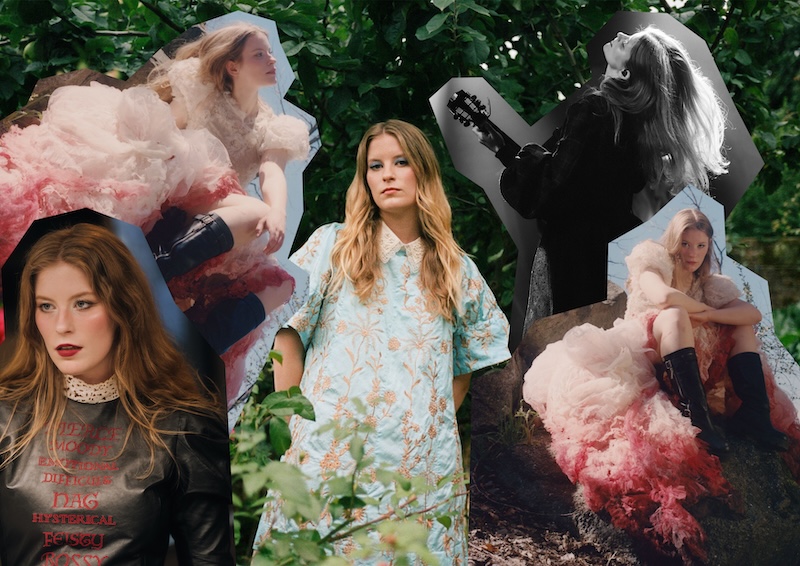
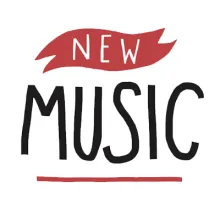 New Music
New Music

